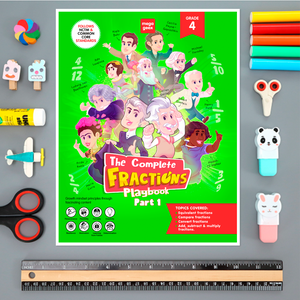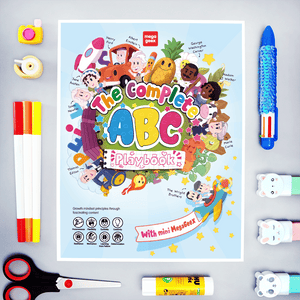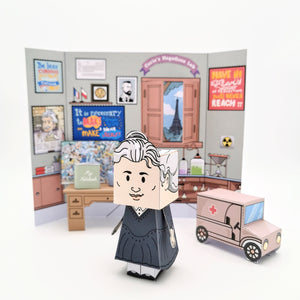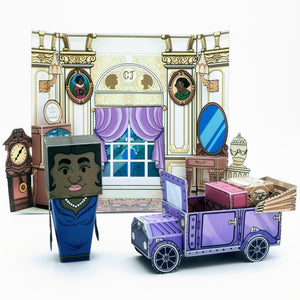How to Improve a Child's Self-Esteem and Build Their Confidence?
Imagine if you could go back in time and tell your younger self one thing. What would it be? For me, I would tell myself not to care so much about what other people think. This is especially important when it comes to our children. We want them to feel good about themselves and have confidence, but how can we do that when they're constantly faced with negativity from the world around them? It's not easy, but there are ways to help improve a child's self-esteem and build their confidence. Read on for tips!
What is self-esteem?
In simple terms, self-esteem is the opinion we have of ourselves. It’s how we see and judge our own abilities, physical appearance, and worth as a person.

Why is self-esteem so important for children?
A child’s sense of self-esteem influences their behavior and studies have shown that children with high self-esteem are more likely to be successful academically and feel good about themselves. In contrast, children with low self-esteem are more likely to experience anxiety, depression, and low academic achievement.
Toddlers and self-esteem
During the toddler years, kids start to develop a sense of who they are separate from their parents. They become more independent and are able to do things on their own. This is a time when toddlers start to form their own opinions and preferences. It’s important for parents to encourage this independence and praise their children for their accomplishments during this stage.
Preschoolers and self-esteem
As kids enter preschool, they begin to compare themselves to other children their age. They may start to feel shy or embarrassed if they think they don’t measure up. It’s important for parents to help preschoolers understand that everyone is different and special in their own way.

Primary school children and self-esteem
By the time kids reach primary school, they have a pretty good sense of who they are. However, they may still compare themselves to others and may start to feel inferior if they think they don’t measure up. This is when it’s important for parents to help kids understand that everyone has different strengths and weaknesses. It’s also crucial for parents to provide support and encouragement during this stage.
How does self-esteem change over time in kids?
Self-esteem generally increases as kids get older because they become more confident in their abilities and feel more comfortable in their own skin. However, there can be dips during puberty when kids begin to compare themselves more closely with others. This is why it’s so important for moms and dads to continue providing support and encouragement during these years.
10 proven methods to build your child's strong self-esteem:

-
Encourage Them to Be Independent
Encourage your child to be independent and make their own decisions whenever possible. This will help them to feel confident in their ability to make choices and handle responsibility. -
Listen to Them
Make sure you listen to your child when they talk to you. Show them that you value their thoughts and opinions by giving them your full attention. -
Help Them Set Goals
Help your child set realistic goals for themselves and then encourage them to work towards achieving those goals. This will help them to develop a sense of accomplishment and pride in their achievements. -
Compliment Them Often
Make sure you let your child know when they’ve done something well. Compliments will help them to feel good about themselves and their abilities. Just be sure not to overdo it – too many compliments can actually have the opposite effect! -
Avoid Criticism
Try to avoid criticizing your child wherever possible. If you must give criticism, always coach it in positive terms (“I noticed that you didn’t pick up your toys – next time, let’s try to put them away as soon as we’re finished playing with them”). Too much criticism can damage a child’s self-esteem. -
Encourage Them to Try New Things
Challenge your child to try new things, even if they’re scared or unsure at first. Stepping out of their comfort zone will help them to build confidence in themselves and their abilities. -
Accept Them for Who They Are
Accept your child for who they are, not who you want them to be. This will help them feel loved and valued, which is essential for healthy self-esteem. -
Help Them Handle Failure
Teach your child how to deal with failure in a healthy way by helping them see it as an opportunity to learn and grow. This will help them develop resilience and confidence in their ability to overcome challenges. -
Spend Time With Them
Make sure you spend quality time with your child on a regular basis doing things that they enjoy – this will help strengthen the bond between you and make them feel loved ans supported. -
Model Healthy Behavior
Lastly, one of the best ways you can boost their self-esteem is by modeling healthy behavior yourself. Show them how important it is to respect, kindness, empathy, and compassion. Letting see how you live these values in action inspires follow suit.
By following these tips, you can assist your child to develop a strong sense of self-esteem that will serve them well throughout their life.

What are some common pitfalls that parents make when it comes to their child's self-esteem:
Not Praising Effort: One of the most common mistakes parents make when it comes to their children's self-esteem is failing to praise effort. This can send the message that only results matter and that failure is not an option. Instead, it's important to praise your child for their hard work, even if they don't always succeed.
Comparisons: Comparing your child to others, whether it's their siblings, classmates, or even other children on television, can be damaging to their self-esteem. It sends the message that they are not good enough as they are and that they need to live up to someone else's standards.
Refusing to Allow Failure: As mentioned above, failure is a part of life. But some parents try to protect their children from failure at all costs. This can actually do more harm than good, as it prevents children from learning how to cope with disappointment and setbacks.
Putting Too Much Pressure on academic Achievement: For some parents, their child's academic achievement is a reflection of their own success as a parent. This can put a lot of pressure on kids and make them feel like they have to be perfect in order to please their parents.
Withholding Affection: Some parents believe that showing too much affection will make their children "soft." But in reality, withholding affection can make children feel unloved and unvalued. So don't be afraid to show your kids some love!
Being excessively critical: Although it's important to point out areas where improvement is needed, being excessively critical of your child can damage their self-esteem. Try to focus on the positives and encourage your child instead of constantly pointing out their flaws.
Failing to Encourage Independence: Overindulging your child or failing to encourage independence can actually undermine their self-esteem. Kids need to feel like they are capable of doing things on their own in order to develop a healthy sense of self-worth.
Making Family life all about Performance: For some families, family life revolves around performance. Whether it's getting good grades, playing a sport, or participating in extracurricular activities, there is always some sort of competition going on. This can create a lot of pressure on kids and make them feel like they have to be perfect in order to please their parents.
Being a helicopter parent: Hovering over your child and not allowing them any room for independence can actually damage their self-esteem. Kids need to feel like they are capable of doing things on their own in order to develop a healthy sense of self-worth.
Treating siblings differently: Parents often inadvertently treat siblings differently, whether it's showing more affection towards one child or enforcing stricter rules for another. This can lead kids to feel like they are not good enough or that they are being treated unfairly, both of which can damage their self-esteem.

How do you deal with negative comments about your child from others:
Anyone who has ever been a parent knows that one of the most difficult parts of the job is dealing with the judgments of others. Whether it's friends, family, or strangers, it seems like everyone has an opinion on how you should raise your child. And while criticism can be hard to take, there are some ways to deal with it in a constructive way. Here are five tips for responding to negative comments about your child:
Thank the person for their input.
It can be tempting to lash out when someone criticizes your parenting skills, but thank them instead. This will diffuse the situation and help to keep the conversation civil.
Explain why you made the decision you did.
If the person making the negative comment doesn't understand your reasoning, take a moment to explain why you made the decision you did. They may not agree with you, but at least they'll see that you're thinking about what's best for your child.
Offer an alternative solution.
If the person making the negative comment has a valid point, offer an alternative solution that meets both of your needs. For example, if they think your child is watching too much television, suggest a different activity that you can do together as a family.
Agree to disagree.
Sometimes, no matter how well you explain yourself, the other person is just not going to see eye-to-eye with you. In these cases, it's best to agree to disagree and move on. After all, you're the one who knows your child best.
Let it go.
It's easy to get wrapped up in what other people think, but at the end of the day, their opinions don't matter nearly as much as yours do. So let it go and focus on being the best parent you can be for your child."

What should you do if your child has low self-esteem:
You know the feeling. Your friends all seem to think their kids are amazing and can do no wrong, while you seem to be the parent of the one child who just can't catch a break. If your child has low self-esteem, don't despair. There are things you can do to help. Here are six tips:
Talk to your child's teacher. If your child is struggling in school, it can be a major contributor to low self-esteem. Talk to your child's teacher about what is going on and see if there are ways you can work together to help your child succeed.
Encourage positive self-talk. Help your child learn to speak kindly to themselves by encouraging them to use positive self-talk. For example, "I am smart and capable" or "I am doing my best."
Help them find their passion. Every child is unique and has their own interests and talents. Helping your child find activities that they are passionate about can go a long way toward boosting their self-esteem.
Model healthy behavior. As a parent, you are one of the biggest influences in your child's life. Show them how to take care of themselves by eating well, exercising, and managing stress in healthy ways.
Limit screen time. Too much time spent on screens can lead to feelings of isolation and disconnection, both of which can contribute to low self-esteem. Make sure your child has plenty of time for face-to-face interactions with family and friends.
Seek professional help if needed. If you have tried these tips and your child's self-esteem still seems low, it may be time to seek professional help from a therapist or counselor who specializes in helping children with this issue.
When we give children a good sense of self-esteem, it opens up opportunities for them to explore and learn new things. It also gives them the confidence they need to face challenges in their lives. Sadly, many children struggle with low self-esteem at an early age due to peer pressure and age-appropriate choices.
This is where we as adults have a golden opportunity to help these children build their confidence and set themselves up for success. With the right tools, such as positive reinforcement and constructive feedback, we can help children develop high self-esteem that will stay with them for life.

















